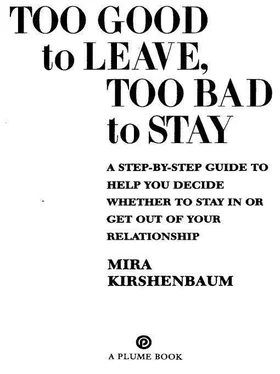Kirshenbaum, Mira - Too Good to Leave, Too Bad to Stay
Здесь есть возможность читать онлайн «Kirshenbaum, Mira - Too Good to Leave, Too Bad to Stay» весь текст электронной книги совершенно бесплатно (целиком полную версию без сокращений). В некоторых случаях можно слушать аудио, скачать через торрент в формате fb2 и присутствует краткое содержание. Жанр: Психология. Описание произведения, (предисловие) а так же отзывы посетителей доступны на портале библиотеки ЛибКат.
- Название:Too Good to Leave, Too Bad to Stay
- Автор:
- Жанр:
- Год:неизвестен
- ISBN:нет данных
- Рейтинг книги:3 / 5. Голосов: 1
-
Избранное:Добавить в избранное
- Отзывы:
-
Ваша оценка:
- 60
- 1
- 2
- 3
- 4
- 5
Too Good to Leave, Too Bad to Stay: краткое содержание, описание и аннотация
Предлагаем к чтению аннотацию, описание, краткое содержание или предисловие (зависит от того, что написал сам автор книги «Too Good to Leave, Too Bad to Stay»). Если вы не нашли необходимую информацию о книге — напишите в комментариях, мы постараемся отыскать её.
Too Good to Leave, Too Bad to Stay — читать онлайн бесплатно полную книгу (весь текст) целиком
Ниже представлен текст книги, разбитый по страницам. Система сохранения места последней прочитанной страницы, позволяет с удобством читать онлайн бесплатно книгу «Too Good to Leave, Too Bad to Stay», без необходимости каждый раз заново искать на чём Вы остановились. Поставьте закладку, и сможете в любой момент перейти на страницу, на которой закончили чтение.
Интервал:
Закладка:
GUIDELINE #9
If your partner constantly and unyieldingly prevents you from talking about things that are important to you, so that you have a sense of being shut down and shut up, then you’re faced with a destructive problem that will not get better by itself. I feel comfortable saying you’ll be happiest if you leave. Quick take: You’ll suffocate if the dirt hits the fan whenever you try to shoot the breeze.
If you feel this guideline applies to you, don’t do anything yet. Sometimes it’s hard to tell the difference between a real monster and someone who’s basically fair but has little self-awareness. So you’ve got to make a test. When you see a way your partner takes things off the table, point it out.
Say for example, “Whenever I want to talk about visiting my family [or whatever the issue is], you get so upset that I feel I’m not even permitted to bring it up.” Maybe you’ll make progress letting your partner know what he’s doing. Then guideline #9 doesn’t apply to you. But maybe your partner will just find another way to make it impossible for you to talk about what’s important to you. If holding up a mirror to your partner does nothing to diminish his tendency to shut down communication, then you’re confirmed in your sense that you’ll be happier leaving.
There’s one exception to this guideline. You just might be doing something that fosters your partner’s off-the-table-itis. You might be one of those people who absolutely refuse to take no for an answer. No matter how clearly an issue’s been discussed and decided, for these people the issue remains open forever and they keep bringing it up.
For example, one woman had a full, frank, and open discussion with her husband about her wanting to spend money to remodel the house. He was very open to talking about it with her and showed her how they simply couldn’t afford it at that time. She understood what he was talking about and even agreed with him. But then she wouldn’t let it drop. She kept bringing up an already-decided issue over and over. Naturally he didn’t want to keep talking about it. That’s not off-the-table-itis.
The Problem That Makes Problems
Why am I making such a big deal about off-the-table-itis? Every relationship has disagreements, but when disagreements are ruled out of order and not allowed to get aired, there’s an even more basic problem that can’t be fixed. How can you fix something you can’t even talk about because your partner takes things off the table by getting mad or miserable when you bring them up, or only listens to you with an unyielding refusal to let anything in?
A pattern like this is highly resistant to change because it rules itself off the table. It’s the communication problem that prevents the solving of every other problem.
Your partner’s off-the-table-itis is particularly destructive because of the way it so often focuses on your attempts to give feedback. Feedback is the simple ability to say, “I like this,” “I don’t like that,” “This hurts me,” “That doesn’t hurt me.” This airing of feelings is the oxygen that relationships need to be able to breathe. Without it they suffocate, because without it things go from good to bad to worse without anyone being able to do anything to turn the situation around.
When someone blocks your attempt to give feedback—by getting hurt, by getting angry, by turning the tables and launching into a tirade about what’s wrong with you, by simply refusing to listen—it’s as if he were putting up a huge sign that said, “I just don’t care if this is a relationship that feels good to you.”
I see how utterly devastating off-the-table-itis is every day. It’s like the difference between a dog and a wolf. Some relationships are like a dog: even a really dumb dog can learn some tricks. But a wolf, however bright and beautiful, refuses to be tamed. He might be magnificent in nature but you can’t have him in your house: his wildness precludes any attempt to train him. He won’t allow himself to be influenced.
In a nutshell, it’s not the things that make communication difficult that make a relationship too bad to stay in. Even if it’s an uphill battle, you can still win it. It’s the things that make communication impossible that make a relationship too bad to stay in. Off-the-table-itis is one of them.
Now imagine if there were something that went even further, that not only prevented communication but actually subtracted from it. That’s our next question, and we’ll get to it after we put off-the-table-itis in perspective as part of the central drama in relationships.
PERSPECTIVES: SAFETY FIRST
Some people are surprised that something like off-the-table-itis is so important in pointing to a relationship that’s too bad to stay in. It’s bad, they say, but it doesn’t sound totally horrible. Why are you emphasizing it?
Let me put it in context. Here’s something that I believe is at the heart of what goes on in relationships and at the heart of what’s necessary to fix relationships:
Telling someone something means revealing something. So in a sense, communication is a process of getting naked. Not physically, but interpersonally. The closer you are to someone, the closer communication brings you to this interpersonal nakedness. And love is the place where it’s safe to be naked. Everywhere else in our lives we have to put on half-masks of politeness, regardless of how we really feel. But part of the experience of falling in love and being in love is taking off these masks.
Of course we take off our clothes as part of physical intimacy, but we let our hair down in other ways as well, confessing secrets and showing parts of ourselves no one else in the world sees. So we’re not just naked physically but also naked emotionally and naked as who we really are as people. And not only does love mean feeling safe as you get naked, it means relaxing into feeling more safe the more naked you get.
But this doesn’t mean you have to get totally naked in every possible way. People also need boundaries, and some people need more boundaries than others. For example, many people will never feel comfortable with their partner’s being in the same room while they go to the bathroom. And there’s nothing wrong with that. But if there are so many boundaries and they’re so high that your relationship is more about hiding and distance than openness and closeness, then your relationship is a place where it’s not safe to be naked.
The problem is that when you’re naked you’re also vulnerable. People can get hurt when they reveal themselves. The things people say and do to reveal themselves can create problems, fear, and pain instead of safety. So I’ve learned that no matter what problems people bring into therapy and no matter what other issues I work on with them, I’ve also got to make their relationship a place where each person learns how to find safety being himself (for example, “I can reveal my goofy sense of humor without getting mocked”) while providing safety for the other person to be herself (for example, “I learned how to stop making you feel it’s not okay for you to be in a bad mood once in a while”).
Shut Up and Put Your Clothes On
Balancing nakedness and safety can be difficult for some people to handle. If it’s too difficult, then that’s a relationship that’s too bad to stay in. And understanding why it can be too difficult can help you understand why a relationship can be too bad to stay in.
If love is the place where it’s safe to be naked, then every relationship is an attempt to answer these questions:
• Can I be safe when you’re naked? Will I still feel comfortable when you let your hair down and show yourself for who you really are and say what you feel and do what you really want?
Читать дальшеИнтервал:
Закладка:
Похожие книги на «Too Good to Leave, Too Bad to Stay»
Представляем Вашему вниманию похожие книги на «Too Good to Leave, Too Bad to Stay» списком для выбора. Мы отобрали схожую по названию и смыслу литературу в надежде предоставить читателям больше вариантов отыскать новые, интересные, ещё непрочитанные произведения.
Обсуждение, отзывы о книге «Too Good to Leave, Too Bad to Stay» и просто собственные мнения читателей. Оставьте ваши комментарии, напишите, что Вы думаете о произведении, его смысле или главных героях. Укажите что конкретно понравилось, а что нет, и почему Вы так считаете.












